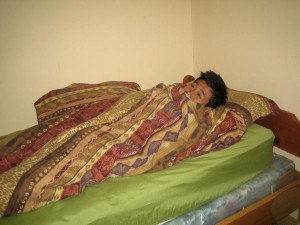Delirium is defined as a transient, typically reversible, cerebral dysfunction. The quick changes in the brain function lead tothe disturbance in the mental abilities of a person, which result to a reduced awareness of the environment and abrupt, severe confusion. It may last from just a few hours to several days and have a fluctuating course. It is commonly caused by an underlying physical or mental illness; however, there are typically more causative factors that may be present. Although it can occur at any age, it most commonly occurs in elderly patients with a compromised mental status. Hospital stay, particularly patients in intensive care unit are at greater risks of developing delirium.
Causes of Delirium
Delirium occurs upon impairment of sending and receiving of signals in the brain that result to vulnerability of the brain, which may cause a malfunction in brain activity. The causes of delirium include:
- Dehydration or poor nutrition
- Infections, such as pneumonia, urinary tract infection, abdominal, and skin infections, among others
- Fever and acute infection, especially in children
- Previous brain damage, such as dementia, stroke, brain tumour, etc.
- Alcohol or drug abuse or withdrawal
- Poisons
- Hypoxia
- Hypoglycaemia
- Surgery
- Head trauma
- Certain medications such as those used for pain, sleep, allergy, asthma, mood disorders, convulsions, among others
Symptoms of Delirium
The hallmarks of delirium are growing and fading type of confusion and reduced attention span. The other common symptoms of delirium are the following:
- Clouding of consciousness or unstable levels of consciousness or awareness(e.g. more alert in the morning, less alert at night)
- Changes in sensations and perceptions
- Struggle maintaining or fluctuating attention
- Unable to thing or behave with purpose
- Trouble concentrating
- Illusions and hallucinations
- Disorientating about place or time
- Disorganized thinking
- Speech and verbal comprehension impairment (dysphasia)
- Difficulty saying words (dysarthria)
- Changes in movement (e.g. moving slowly or hyperactivity)
- Changes in sleep patterns
- Decline in short-term memory and recall
- Anterograde amnesia: incapable of remembering events since onset of delirium
- Retrograde amnesia: incapable of remember events even before onset of delirium
- Emotional or personality changes
- Anger
- Depression
- Apathy
- Anxiety
- Irritability
- Agitation
- Euphoria
- Incontinence
- Tremor
- Uraemia
Treatment for Delirium
The goal of treatment is to regulate orinverse the cause of the symptoms. Treatment will be tailored according to its cause. Only a doctor can advise proper treatment. The following treatments may be done:
- Use of particular medications which may include:
- Antidepressants
- Sedatives
- Dopamine blockers
- Thiamine
- Behavioural modifications to control dangerous behaviours
Delirium - Reality orientation to decrease disorientation
- IV fluids may be administered for severe dehydration
- For infections, antibiotics are usually given.
- For poisons, call the local poison control center.
Disclaimer: This article does not provide medical advice or treatment. The information given should not be used for self-diagnosis of possible conditions. Seek medical attention when necessary. To learn more about to how to recognize symptoms such as delirium, enrol in First Aid Courses with workplace approved Training.
Source:
Alagiakrishnan, Kannayiram. (2012). Delirium.Medscape. Retrieved October 3, 2013, from http://emedicine.medscape.com/article/288890-overview
Delirium.(2012). National Institutes of Health. Retrieved October 3, 2013, from http://www.nlm.nih.gov/medlineplus/ency/article/000740.htm

